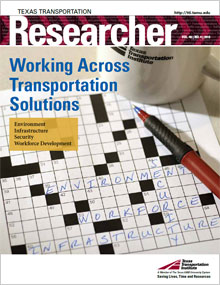
A proverb says that by learning you will teach, and by teaching you will learn. In its mission to educate transportation professionals, the Texas Transportation Institute (TTI) has certainly learned from its students. What we take away is that together we can improve the transportation industry — a vital part of everyday life that touches every facet of society — and thereby improve life for all of us.
“We’re not just training researchers,” says Tim Lomax, TTI research engineer and associate director for the Southwest Region University Transportation Center (SWUTC). “We’re teaching people to think. We show them how to approach a problem and organize their efforts. Then we show them the tools and procedures they can apply to that problem.”
Workforce development at TTI encompasses a broad range of ages and transportation fields. We educate the current workforce by offering seminars and workshops. We educate the future workforce by sponsoring students and their research projects. We educate the very youngest of our future transportation professionals by showing students the many opportunities that await them as engineers and planners. And through our efforts we learn — what the community needs, what we can provide and how we can work together to get it done.
Current Workforce
TTI performs valuable research for the transportation industry, but without implementation, that research could sit on a shelf and collect dust. The seminars and workshops TTI conducts, most notably for the Texas Department of Transportation and the National Highway Institute, are one way to get the word out. Recent topics have included designing and operating intersections for safety, freeway management and operations, traffic signal design and operations, work zone management and design, new approaches to highway safety analysis, and state and metropolitan transportation planning.
“The people we teach aren’t just students,” says Gary Thomas, director of the Center for Professional Development. “They have life experiences that they bring to the classroom, and we always learn something from them. We incorporate that valuable information into the next workshops we teach.”
TTI‘s reach extends internationally as well. Recently, Institute instructors traveled to Thailand and the Middle East to share their expertise — again learning from their students’ different worldviews and perspectives.
Future Workforce
As part of The Texas A&M University System, TTI has strong ties to the education of undergraduate and graduate students. TTI researchers teach university courses and offer classroom lectures. They may also be official or unofficial members of a student’s thesis or dissertation committee. And often Texas A&M professors work on TTI projects.

“It’s important for faculty to be involved in professional activities,” says TTI Research Engineer and Texas A&M Associate Professor of Civil Engineering Gene Hawkins. “Faculty become better at teaching if they’re practicing. They become more knowledgeable about the leading edge and can share the state of the practice with students who will soon enter the workforce.”
Undergraduate and graduate students are an asset to TTI. They work on research projects as student workers or research assistants, bringing different perspectives and focus to their projects. The students themselves learn from transportation professionals, put their learning into practice, and get a jumpstart on their careers, bringing practical experience into the workforce.
The University Transportation Center for Mobility (UTCM) and SWUTC, led by the Institute, are another way TTI supports students. The UTCM and SWUTC fund transportation research but also sponsor student education. With this funding and awards like UTCM Student of the Year, which carries a stipend, students can pursue innovative research that puts another top performer into the transportation industry.
“Our students become consultants, professors and government officials,” says Lomax. “Their shared experiences in the lab give them a better appreciation of how different people think and approach a problem. A shared problem-solving opportunity teaches people how they can benefit from working together.”
Far Future Workforce
TTI casts an eye far down the road — to the transportation industry 15 to 20 years in the future. Who will our transportation professionals be? They’re probably sitting in junior high school right now.
“Grades six, seven and eight are crucial years for children,” says Debbie Jasek, research specialist with the Center for Professional Development. “That’s the age when children figure out what career they’re interested in. Most children know nothing about engineering, and we need to show them what an exciting field transportation is.”
In addition to outreach at schools, Institute professionals attend a variety of events. They demonstrate gadgets, show videos and engage children in fun, creative exercises using science and math. TTI works with the Girl Scouts and Boy Scouts, creates resources for teachers, and partners with other organizations to encourage children to consider transportation as a career.
TTI also hosts the Texas Summer Transportation Institute, funded by the Federal Highway Administration and other sponsors. The program introduces students to the field of transportation through fun activities during two weeks at Texas A&M, Prairie View A&M University or Texas A&M University–Kingsville. Of the students who attend the event, more than 40 percent go into science or engineering fields.
